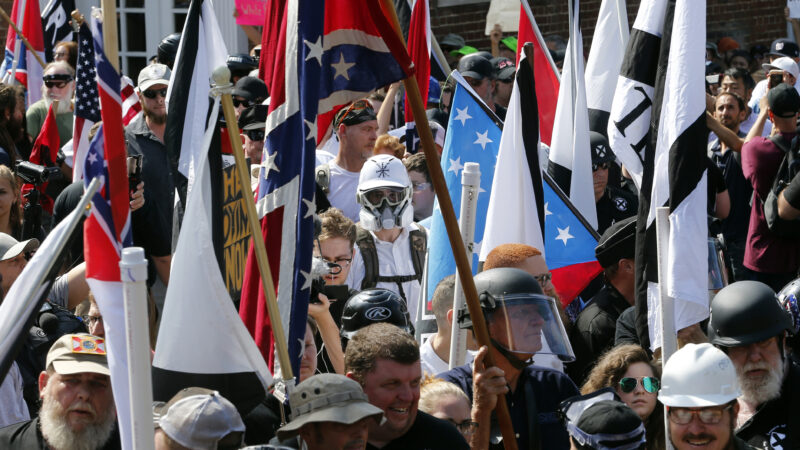Hate groups in the US decline but their influence grows, report shows
White nationalist demonstrators walk into the entrance of Lee Park surrounded by counter demonstrators in Charlottesville, Va., Saturday, Aug. 12, 2017.
By Terry Tang
The number of white nationalist, hate and anti-government groups around the U.S. dropped slightly in 2024, not because of any shrinking influence but rather the opposite. Many feel their beliefs, which includes racist narratives and so-called Christian persecution, have become more normalized in government and mainstream discourse.
In its annual Year in Hate and Extremism report, released Thursday, the Southern Poverty Law Center said it counted 1,371 hate and extremist groups, a 5% decline. The nonprofit group attributes this to a lesser sense of urgency to organize because their beliefs have infiltrated politics, education and society in general. Some of the ways they have done this are through pushing for bans on diversity, equity and inclusion initiatives, book bans and protests of drag story hours, the report says.
Last year, there were 533 active hate groups. These include groups who express views that are anti-LBGTQ+, anti-immigrant, antisemitic and anti-Muslim. This number has been steadily declining since reaching a historic high of 1,021 in 2018.
“The trends have slightly sort of gone up and down but let’s just say generally, since our tracking, have increased. And that’s not just on a total numbers level but also on a per capita,” said Rachel Carroll Rivas, interim director of the SPLC’s Intelligence Project.
The number of anti-government groups last year totaled 838, an increase from recent years, according to the law center based in Montgomery, Alabama, that tracks racism, xenophobia and far-right militias. These groups see the federal government as “tyrannical” and include militias and self-described sovereign citizens.
Male supremacy also continues to emerge as an influential hate group. The SPLC documented seven new male supremacist hate groups, making the total 16. Their rhetoric espouses misogyny and strict gender roles. Their rising influence came during an election year when the country saw a woman of color be the first presidential nominee for a major political party.
“I’m not sure it’s a direct result of the candidacy of Kamala Harris,” Rivas said. However, SPLC researchers went into chatrooms of white supremacist organizations during the election and found “intense vilification, the claiming of demonization of Harris as well as just the pushing of the idea falsely that women would not be qualified.”
Some people on the far right have also pushed a belief that white Christian culture is being threatened by a “demographic crisis” including fewer births.
“Politicians, pundits and provocateurs on the right have turned toward demonic language to tar those who disagree with them,” the report states.
Last year’s report found “record numbers” of white nationalist and anti-LGBTQ groups in 2023. The analysis highlighted how far-right groups tried to waylay democracy through disinformation, false conspiracy theories and threats to election workers. It also examined how supporters of Christian supremacy used similar topics to organize a movement toward authoritarianism.
The SPLC is a liberal advocacy organization that, besides monitoring hate groups, files lawsuits over justice issues and offers educational programs to counter prejudice. Frequently criticized by conservatives as biased, the nonprofit has faced lawsuits for its designation of some organizations as hate groups.
The report’s release comes as a Los Angeles college professor makes his first public appearance since he was severely injured in a hit and run that he reported as a hate crime. He is scheduled to speak Thursday morning at the Chinese American Museum in downtown Los Angeles.
Aki Maehara, 71, was riding his electric bicycle in Montebello, 10 miles (16 kilometers) east of downtown Los Angeles, on April 29 when he says he heard a driver yell a racial slur. Maehara says a car then struck him and the driver fled. He was hospitalized with a concussion, neck injury, cheek bone fracture and bruises and swelling up and down his body.
Maehara, who is Japanese American, teaches a course on the history of racism in the U.S. at East Los Angeles College.
The Montebello Police Department is investigating.
Photos of his injuries posted to a GoFundMe page have been shared multiple times on social media with users calling for hate crime charges. The crowdsourcing campaign has raised almost $77,000 for Maehara.
Auburn tabs USF’s Alex Golesh as its next coach, replacing Hugh Freeze on the Plains
The 41-year-old Golesh, who was born in Russia and moved to the United State at age 7, is signing a six-year contract that averages more than $7 million annually to replace Hugh Freeze. Freeze was fired in early November after failing to fix Auburn’s offensive issues in three seasons on the Plains.
Alabama Power seeks to delay rate hike for new gas plant amid outcry
The state’s largest utility has proposed delaying the rate increase from its purchase of a $622 million natural gas plant until 2028.
Former U.S. Sen. Doug Jones announces run for Alabama governor
Jones announced his campaign Monday afternoon, hours after filing campaign paperwork with the Secretary of State's Office. His gubernatorial bid could set up a rematch with U.S. Sen. Tommy Tuberville, the Republican who defeated Jones in 2020 and is now running for governor.
Scorching Saturdays: The rising heat threat inside football stadiums
Excessive heat and more frequent medical incidents in Southern college football stadiums could be a warning sign for universities across the country.
The Gulf States Newsroom is hiring an Audio Editor
The Gulf States Newsroom is hiring an Audio Editor to join our award-winning team covering important regional stories across Mississippi, Alabama and Louisiana.
Judge orders new Alabama Senate map after ruling found racial gerrymandering
U.S. District Judge Anna Manasco, appointed by President Donald Trump during his first term, issued the ruling Monday putting a new court-selected map in place for the 2026 and 2030 elections.









